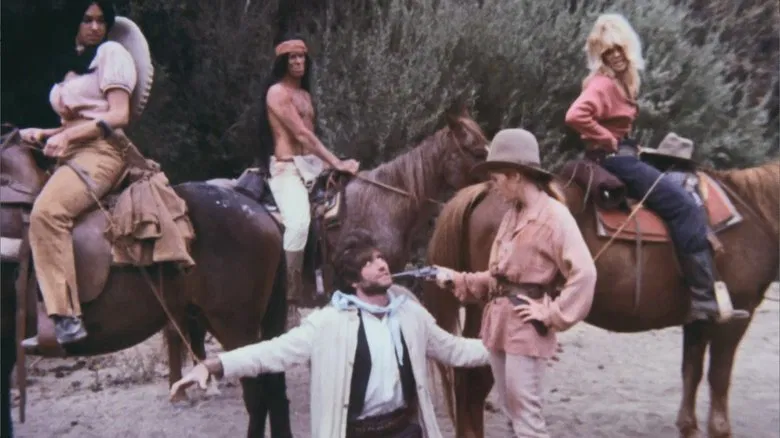-Grindhouse Fest is the special section in Celluloid Dimension where you can discover all the goodies…and baddies from the golden age of exploitation cinema. Have fun!
Directed by Al Adamson
Written by Budd Donnelly
Starring:
- Sondra Currie as Jessica Hartwell
- Geoffrey Land as Sheriff Clay
- Ben Frank as Frank Brock
- Regina Carrol as Claire
- Jennifer Bishop as Rachel
- Ellyn Stern as Kana
- Joe Cortese as Baldry
Rating: ![]()
 Al Adamson’s western exploitationer strips the rape-revenge tale to its most brutal essentials—lean, unsentimental, and blunt as a rifle butt. The film follows a Mormon couple who, while traveling through the Old West, fall into the clutches of a vicious gang of outlaws. Jessica is savagely gang-raped while her husband, strung up and helpless, is forced to witness the assault before both are shot and left for dead. But Jessica survives—and with nothing left but grief and fury, she sets out across the frontier with a single, consuming purpose: to avenge her murdered husband.
Al Adamson’s western exploitationer strips the rape-revenge tale to its most brutal essentials—lean, unsentimental, and blunt as a rifle butt. The film follows a Mormon couple who, while traveling through the Old West, fall into the clutches of a vicious gang of outlaws. Jessica is savagely gang-raped while her husband, strung up and helpless, is forced to witness the assault before both are shot and left for dead. But Jessica survives—and with nothing left but grief and fury, she sets out across the frontier with a single, consuming purpose: to avenge her murdered husband.
Shot with the roughness and urgency of economical filmmaking, Jessi’s Girls is as crudely executed as the violence it depicts. The editing is jagged, the camerawork rudimentary, but these technical flaws are offset by the raw immediacy of its tone—and, most of all, by Sondra Currie’s gripping performance. She gives Jessi a stoic intensity that burns beneath the film’s exploitation trappings. There is something unexpectedly soulful in Currie’s portrayal, a sense of inner life and haunted resolve that recalls the mythic heroines of more lyrical Westerns. In a genre that often flattens women into symbols, Currie’s Jessi emerges as fully human—wounded, burning, and utterly unyielding.
As Jessi travels across the harsh American landscapes, she rescues three imprisoned women—each of them, like her, a victim of Western machismo. What begins as a solitary revenge narrative expands into something more dynamic: a coalition of women challenging the same patriarchal forces that brutalized them. The film shifts from isolated vengeance to collective resistance, introducing a current of sisterhood that unsettles the male-dominated world they traverse. Jessi’s revenge, at first driven by personal loss, becomes something more charged and subversive. It is still brutal and pitiless, but now it carries the weight of a shared reckoning—a feminist act of reclamation.
Despite its exploitative, sleazy packaging, Jessi’s Girls finds moments of surprising depth and emotional truth. Through Sondra Currie’s powerful performance, Adamson taps into a fierce, human core—allowing a character born in pulp to speak with the clarity and force of myth. What might have been merely sensational becomes, ultimately, meaningful and deeply satisfying.









